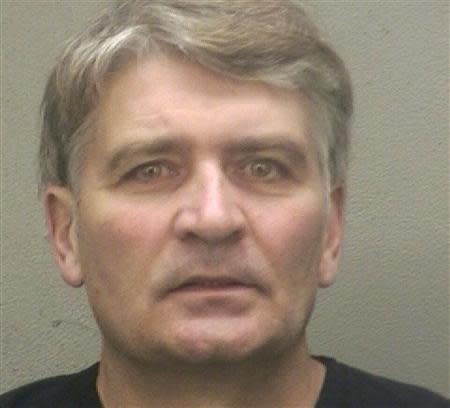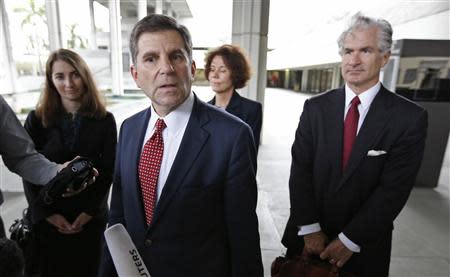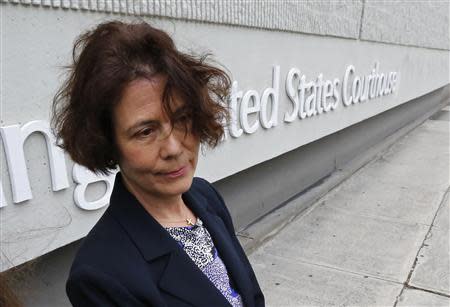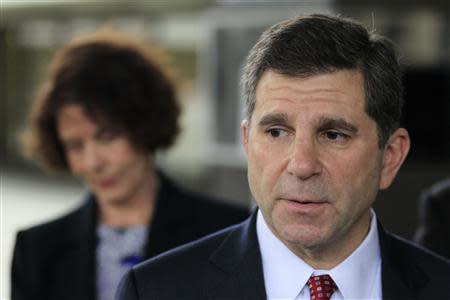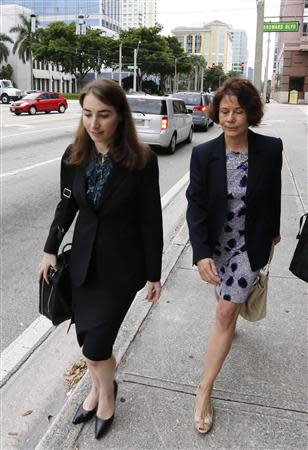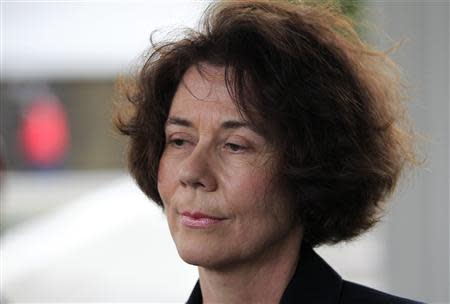Florida judge grants $10.5 million bail for ex-UBS banker
By Zachary Fagenson FORT LAUDERDALE, Florida (Reuters) - Raoul Weil, a former high-ranking UBS banker charged with tax fraud by U.S. authorities, was ordered freed on bail of $10.5 million on Monday in federal court in Fort Lauderdale. Weil, a 54-year-old Swiss citizen, is charged with helping Americans dodge taxes via secret Swiss bank accounts. Weil appeared in shackles and a gray prison jumpsuit three days after he was extradited from Italy. He did not enter a plea and his arraignment was postponed until January 7. "Mr. Weil has consistently denied wrongdoing in this case. He intends to enter a not guilty plea in January," his lawyer Aaron Marcu, told Reuters by email after the bail hearing. U.S. Magistrate Judge Patrick Hunt agreed to let Weil stay with friends in New Jersey after putting up the bond, which included $9 million in a personal surety by Weil, $500,000 from the New Jersey family and the other $1 million a corporate surety bond signed with a bail bondsman. Weil, the ex-head of wealth management at UBS , was arrested in mid-October on vacation with his wife at an upscale hotel in the northern Italian city of Bologna. He was extradited to the United States late last week after an Italian judge rejected a request for house arrest. If convicted, he faces up to five years in prison for conspiracy to commit tax fraud. The judge ordered Weil be placed on a GPS monitoring system and surrender his passport. Weil's attorney told the court that his client had assets of $11.2 million, all held offshore, mostly in cash and securities. "He didn't run from the U.S., he never fled," said Marcu, head of the global financial institutions litigation at the New York firm Freshfields Bruckhaus Deringer. Weil oversaw $4 trillion in assets at UBS, Marcu said. "He rose from being a bit of a technocrat and demonstrated that he could run a bigger business." His trial could help the United States and other Western countries step up their hunt for individuals and companies that use opaque offshore financial centers to avoid paying taxes. Five years ago the United States charged Weil and other unnamed executives from UBS with helping more than 17,000 Americans conceal $20 billion in secret Swiss bank accounts. Weil disputed the charges and was declared a fugitive a few months later. He left UBS after being indicted, and joined a small Swiss bank, Reuss Private Group. In a landmark 2009 settlement UBS paid a $780 million fine and agreed to hand over the names of U.S. clients with secret accounts, breaking Switzerland's tradition of banking secrecy, to avoid feared criminal charges against the bank or other executives. Legal experts said they were not surprised by the bond, adding that Weil may be in the process of making a deal with prosecutors. "He voluntarily waived extradition," said David Weinstein, a former federal prosecutor in Miami specializing in white collar crime. "However, the fact that he has been released on bond suggests that he has either negotiated a resolution of his case or that he is in the process of cutting a deal with the prosecutors," he said. "I know there's a lot of speculation," Marcu told Reuters in an email. "We are not engaged in negotiations with the government at this time," he added. Critics of the government's efforts to prosecute UBS fear Weil may be given a sweetheart deal to protect some of the bank's clients, who they say include U.S. politicians, according to Stephen M. Kohn, director of the National Whistleblower Center. Weil was the boss of UBS whistleblower Bradley Birkenfeld, who provided U.S. authorities documents in 2007 revealing the international fraud schemes managed by Weil, according to Kohn, who is one of Birkenfield's lawyers. "UBS had an ultra secret special program for which the bank would accept millions and billions of dollars from ... highly placed government officials," Kohn said. "We fear that political pressure from high ranking officials and extremely wealthy individuals, both from the United States and those in power in foreign countries, will result in a cover-up," he added. Weil's extradition came as Swiss banks grapple with a U.S. offer to come clean by year-end on their American clients and face fines, an investigation spawned by UBS' landmark settlement. "Thousands of Americans have come forward since the UBS case, but we know, from lawsuits filed in Switzerland, that there are still people out there trying to fight the disclosure of tax information," said Stuart Gibson, an ex-Department of Justice tax attorney who had a prominent role in the UBS case. Gibson said Weil's trial is likely to be followed by tax authorities in other countries as well. "Germany has got a lot of people in the same position and so have other European countries like France, Britain and Italy," he said. Tax experts say much still needs to be done to ensure financial centers in Asia and the Middle East come on board. Though pressure has increased on well-known tax havens such as Switzerland and the Cayman Islands, new countries are emerging as popular tax havens. (Writing by David Adams; Additional reporting by Tom Brown, Lisa Jucca, Valentina Accardo and Patrick Temple-West; Editing by Dan Grebler)

